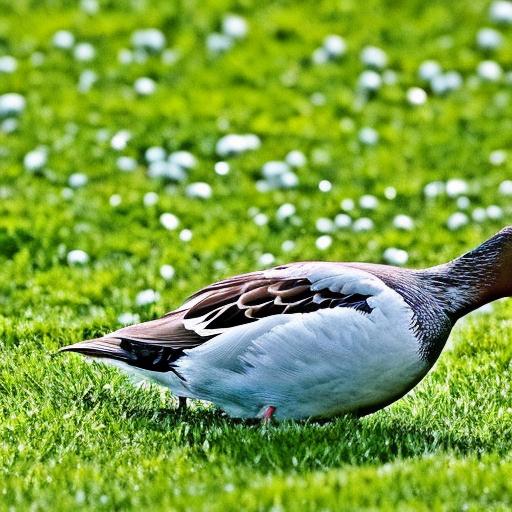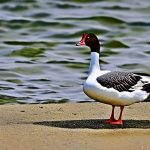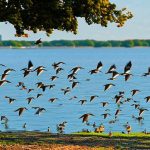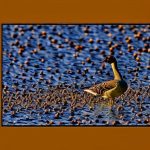Geese on lawns can be a nuisance for many homeowners. They leave behind droppings that can be unsightly and difficult to clean up. Additionally, geese can cause damage to lawns by eating grass and plants. Fortunately, there are several methods that can be used to keep geese away from lawns. These methods range from natural deterrents to physical barriers, sound devices, visual deterrents, and even trained dogs. By understanding the behavior of geese and implementing these methods, homeowners can effectively keep geese off their lawns.
Key Takeaways
- Geese are attracted to lawns because they provide easy access to food and water.
- Natural deterrents like planting certain types of grass or using decoys can help keep geese away.
- Physical barriers like fences or netting can prevent geese from entering the lawn.
- Sound devices like alarms or sirens can scare off geese, but need to be used strategically.
- Visual deterrents like reflective tape or predator decoys can also deter geese from landing on lawns.
Understanding the behavior of geese on lawns
Geese are attracted to lawns for several reasons. Lawns provide a source of food in the form of grass and plants. They also offer open spaces for geese to rest and nest. When geese land on lawns, they typically form large groups called gaggles. They will graze on the grass, leaving behind droppings as they go. Geese are known to be territorial and can become aggressive if they feel threatened or if they have established a nesting site.
Natural deterrents for keeping geese off the lawn
One method of keeping geese off the lawn is by using natural deterrents. Certain plants and herbs are known to repel geese due to their strong scent or taste. For example, planting tall grasses such as switchgrass or miscanthus can create an unappealing environment for geese. These grasses have sharp edges that make it difficult for geese to walk through them. Other plants such as lavender, rosemary, and mint have strong scents that can deter geese from landing on lawns.
Setting up physical barriers to prevent geese from entering
Physical barriers can be an effective way to keep geese off the lawn. Fences and netting can be installed around the perimeter of the lawn to prevent geese from entering. The fence should be at least three feet high and have a top that slopes outward to discourage geese from flying over it. Netting can be used to cover ponds or other water features on the property to prevent geese from landing and swimming in them. It is important to ensure that the barriers are properly installed and maintained to be effective.
Using sound devices to scare off geese
Sound devices can be used to scare off geese and prevent them from landing on lawns. Sirens, alarms, and even loud music can be effective in deterring geese. These devices create a loud and unfamiliar noise that can startle the geese and make them feel unsafe. It is important to vary the sound patterns and frequencies to prevent the geese from becoming accustomed to the noise. Additionally, it is important to use these devices sparingly as they can also disturb neighbors.
Visual deterrents that deter geese from landing on lawns
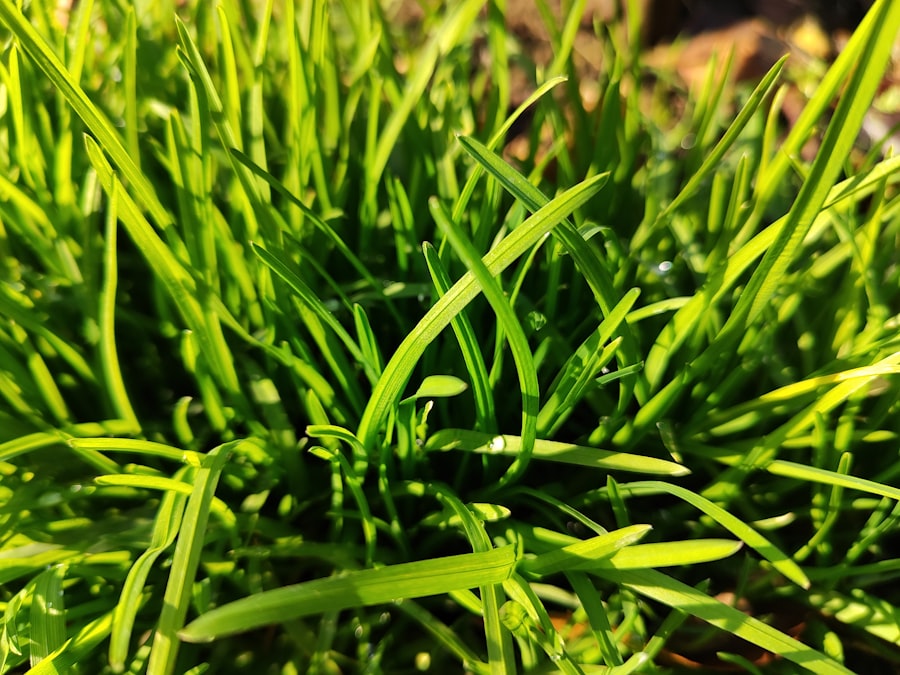
Visual deterrents can also be used to deter geese from landing on lawns. Decoys such as plastic owls or coyotes can be placed on the lawn to create the illusion of a predator. Geese are naturally wary of predators and will avoid areas where they are present. Flags or streamers can also be used to create movement and scare away geese. These visual deterrents should be moved regularly to prevent the geese from becoming accustomed to them.
The importance of keeping lawns clean to discourage geese
Geese are attracted to dirty lawns because they provide a source of food. They will graze on grass and plants, leaving behind droppings as they go. To discourage geese from landing on lawns, it is important to keep them clean and free of debris. Regularly mowing the lawn and removing fallen leaves or branches can help deter geese. Additionally, it is important to promptly clean up any goose droppings to prevent them from attracting more geese.
Creating a hostile environment for geese through landscaping
Landscaping techniques can be used to create a hostile environment for geese and discourage them from landing on lawns. For example, planting shrubs or bushes around the perimeter of the lawn can create a barrier that geese are less likely to cross. Additionally, creating uneven terrain with rocks or mulch can make it difficult for geese to walk on the lawn. It is important to regularly maintain the landscaping to ensure its effectiveness.
The benefits of using trained dogs to keep geese away
Using trained dogs can be an effective way to keep geese away from lawns. Dogs are natural predators and their presence can deter geese from landing. Certain breeds, such as Border Collies, are particularly effective at herding and chasing away geese. Training dogs to respond to commands such as “leave it” or “go away” can help homeowners control their behavior around geese. It is important to note that not all dogs are suitable for this task and proper training is necessary.
The role of professional wildlife control in keeping geese off the lawn
In some cases, homeowners may need to seek the help of professional wildlife control companies to effectively keep geese off their lawns. These companies have the knowledge and experience to assess the situation and implement appropriate measures. They may use a combination of methods such as habitat modification, harassment techniques, and exclusion methods to deter geese. Professional wildlife control companies can also provide ongoing maintenance and monitoring to ensure long-term success.
The legal implications of removing geese from lawns
It is important to be aware of the legal implications of removing geese from lawns. In many areas, geese are protected under federal or state laws and it is illegal to harm or kill them without proper permits. However, there are certain circumstances where it is legal to remove geese, such as when they pose a threat to public health or safety. It is important to consult local regulations and seek professional advice if unsure about the legality of removing geese.
In conclusion, there are several methods that can be used to keep geese away from lawns. These methods range from natural deterrents to physical barriers, sound devices, visual deterrents, trained dogs, and professional wildlife control. By understanding the behavior of geese and implementing these methods, homeowners can effectively keep geese off their lawns. It is important to try different methods and find what works best for each individual situation. With persistence and proper maintenance, homeowners can enjoy a goose-free lawn.
If you’re looking for effective ways to keep geese off your lawn, you might also be interested in learning about the importance of the right chicken coop door size. Poultry Wizard offers a helpful article on how to determine the ideal door size for your chicken coop, ensuring the safety and comfort of your feathered friends. Check out their article here to discover more about this essential aspect of chicken keeping.
FAQs
What are some natural ways to keep geese off the lawn?
Some natural ways to keep geese off the lawn include planting tall grasses or shrubs around the perimeter of the lawn, using decoys of natural predators, and installing motion-activated sprinklers.
What are some non-natural ways to keep geese off the lawn?
Some non-natural ways to keep geese off the lawn include using chemical repellents, installing physical barriers such as fences or netting, and using loud noises or flashing lights to scare them away.
Why is it important to keep geese off the lawn?
Geese can cause damage to lawns by eating grass and leaving droppings, which can be unsightly and unsanitary. They can also be aggressive towards humans and pets, posing a potential safety risk.
What are some common mistakes people make when trying to keep geese off the lawn?
Some common mistakes people make when trying to keep geese off the lawn include using ineffective or harmful methods, such as using reflective tape or feeding the geese, and not addressing the root cause of the problem, such as a nearby water source or lack of natural habitat.
What should I do if I encounter a goose on my lawn?
If you encounter a goose on your lawn, it is best to give it space and avoid approaching it. If the goose appears aggressive or is blocking your path, try to detour around it or wait for it to move on its own. Do not attempt to feed or touch the goose.
Meet Walter, the feathered-friend fanatic of Florida! Nestled in the sunshine state, Walter struts through life with his feathered companions, clucking his way to happiness. With a coop that’s fancier than a five-star hotel, he’s the Don Juan of the chicken world. When he’s not teaching his hens to do the cha-cha, you’ll find him in a heated debate with his prized rooster, Sir Clucks-a-Lot. Walter’s poultry passion is no yolk; he’s the sunny-side-up guy you never knew you needed in your flock of friends!

